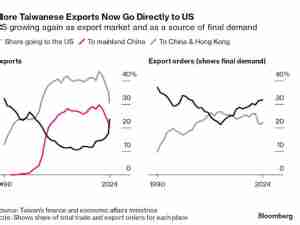The U.S. moved to block China Mobile Ltd. from entering its telecommunications market on national security grounds, launching another salvo in the fight between the world’s two biggest economies days before they’re expected to impose tariffs on each other over trade.
The Federal Communications Commission should deny state-backed China Mobile’s seven-year-old application to offer international voice traffic between the U.S. and foreign countries, the National Telecommunications and Information Administration said in an email on Monday. NTIA, a branch of the Commerce Department, said China Mobile’s entry “would pose unacceptable national security and law enforcement risks.”
Though hardly as threatening as the U.S. measures against telecom equipment maker ZTE Corp.—China Mobile generates virtually all of its revenue at home—the move comes as the U.S. is set to impose tariffs on $34 billion of Chinese goods on Friday, with China vowing to retaliate in kind. President Donald Trump has also threatened additional tariffs on $200 billion of Chinese imports that could be implemented if China imposes counter-measures.
Asked in January about U.S. opposition to China Mobile’s entry into the U.S. market, a spokesman at China’s Ministry of Foreign Affairs said that the government encourages Chinese enterprises to abide by the laws of the markets they invest in and that countries should level the playing field for Chinese enterprises.
ZTE, the Chinese telecom equipment maker that was blocked off from U.S. suppliers in April for violating a sanctions settlement, has seen its stock fallen by about half since the ban was announcement. The company relies on U.S.-made components for some of its products. The U.S. in June reached a deal to allow ZTE to get back in business after the Chinese telecommunications company pays a record fine and agrees to management changes.
‘Risks and Vulnerabilities’
China Mobile is the world’s largest mobile phone operator by customers, with about 899 million subscribers. In the NTIA filing, the carrier indicated it didn’t intend to offer mobile service within the U.S.
“The deepening integration of the global telecommunications market has created risks and vulnerabilities in a sector replete with a broad range of malicious activities,” the NTIA said in its filing.
The Chinese government could use links established by China Mobile for economic espionage and intelligence collection, according to the filing. Customers could include fixed and mobile network operators, calling-card companies, and business customers.
Officials had “significant engagement” with China Mobile but weren’t able to resolve concerns, David Redl, assistant secretary for communications and information at NTIA, said in a news release.
FCC spokeswoman Tina Pelkey said the commission would review the filing.








